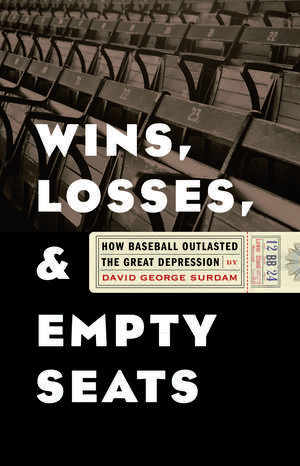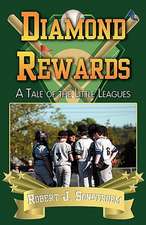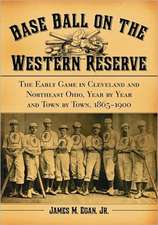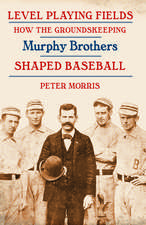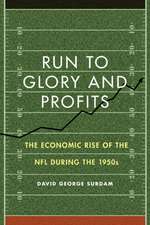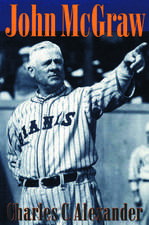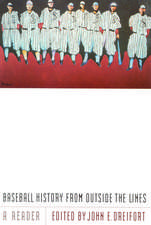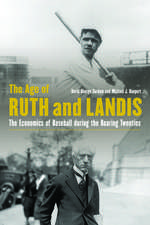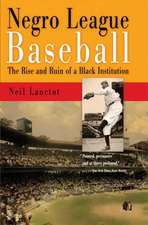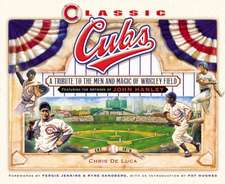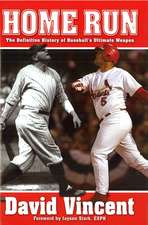Wins, Losses, and Empty Seats: How Baseball Outlasted the Great Depression
Autor David George Surdamen Limba Engleză Paperback – 30 sep 2013
To adjust, teams reduced expenses by cutting coaches and hiring player-managers. While even the best players, such as Babe Ruth, were forced to take pay cuts, most players continued to earn the same pay in terms of purchasing power. Off the field, owners devised innovative solutions to keep the game afloat, including the development of the Minor League farm system, night baseball, and the first radio broadcasts to diversify teams’ income sources.
Using research from primary documents, Surdam analyzes how the economic structure and operations side of Major League Baseball during the Depression took a beating but managed to endure, albeit changed by the societal forces of its time.
| Toate formatele și edițiile | Preț | Express |
|---|---|---|
| Paperback (1) | 221.38 lei 6-8 săpt. | |
| Nebraska Paperback – 30 sep 2013 | 221.38 lei 6-8 săpt. | |
| Hardback (1) | 333.91 lei 3-5 săpt. | |
| Nebraska – 31 mai 2011 | 333.91 lei 3-5 săpt. |
Preț: 221.38 lei
Nou
Puncte Express: 332
Preț estimativ în valută:
42.37€ • 44.07$ • 34.98£
42.37€ • 44.07$ • 34.98£
Carte tipărită la comandă
Livrare economică 14-28 aprilie
Preluare comenzi: 021 569.72.76
Specificații
ISBN-13: 9780803271791
ISBN-10: 0803271794
Pagini: 446
Ilustrații: 3 appendixes
Dimensiuni: 140 x 216 x 30 mm
Greutate: 0.52 kg
Editura: Nebraska Paperback
Colecția University of Nebraska Press
Locul publicării:United States
ISBN-10: 0803271794
Pagini: 446
Ilustrații: 3 appendixes
Dimensiuni: 140 x 216 x 30 mm
Greutate: 0.52 kg
Editura: Nebraska Paperback
Colecția University of Nebraska Press
Locul publicării:United States
Notă biografică
David George Surdam is an associate professor of economics at the University of Northern Iowa. He is the author of Run to Glory and Profits (Nebraska, 2013) and The Postwar Yankees: Baseball’s Golden Age Revisited (Nebraska, 2008).
Cuprins
List of Tables
Acknowledgments
Introduction
Prologue: Clash of Titans
Part 1: The Financial Side of the Game
1. The American Economy and the State of Baseball Profits
2. Why Did Profits Collapse? The Revenue Side
3. Why Did Profits Collapse? Player Salaries and Other Expenses
4. Farm Systems
Conclusion of Economic Side
Part 2: The Game on the Field
5. Competitive Balance
6. Player Movement
Part 3: Using League Rules to Aid in the Recovery
7. Helping the Indigent
8. Manipulating the Schedule to Increase Revenue
Part 4: Innovations to Boost Attendance and Profits
9. Radio and Baseball
10. Baseball Under the Lights
11. Other Innovations
12. How Effective Were the Innovations?
13. The Inept and the Restless: Franchise Relocation
Epilogue: The End of an Era
Appendix 1: Radio and Sunday Ball's Effect on Attendance
Appendix 2: Dramatis Personae
Appendix of Tables
Notes
Bibliography Index
Acknowledgments
Introduction
Prologue: Clash of Titans
Part 1: The Financial Side of the Game
1. The American Economy and the State of Baseball Profits
2. Why Did Profits Collapse? The Revenue Side
3. Why Did Profits Collapse? Player Salaries and Other Expenses
4. Farm Systems
Conclusion of Economic Side
Part 2: The Game on the Field
5. Competitive Balance
6. Player Movement
Part 3: Using League Rules to Aid in the Recovery
7. Helping the Indigent
8. Manipulating the Schedule to Increase Revenue
Part 4: Innovations to Boost Attendance and Profits
9. Radio and Baseball
10. Baseball Under the Lights
11. Other Innovations
12. How Effective Were the Innovations?
13. The Inept and the Restless: Franchise Relocation
Epilogue: The End of an Era
Appendix 1: Radio and Sunday Ball's Effect on Attendance
Appendix 2: Dramatis Personae
Appendix of Tables
Notes
Bibliography Index
Recenzii
“Surdam’s book represents the best and probably the only solid study of major-league baseball’s economic situation during the Depression.”—Dorothy Seymour Mills, New York Journal of Books
“With the American economy struggling, major-league baseball attendance falling for the fourth consecutive year and the Los Angeles Dodgers in bankruptcy, David George Surdam’s Wins, Losses, and Empty Seats about the game's Depression-era troubles is certainly timely. Mr. Surdam, who teaches economics at the University of Northern Iowa, comes to his task armed with a fan's enthusiasm, an economist's tool kit and a certain dissatisfaction with previous analyses—including my own—of the evolution of the baseball business.”—Henry D. Fetter, Wall Street Journal
